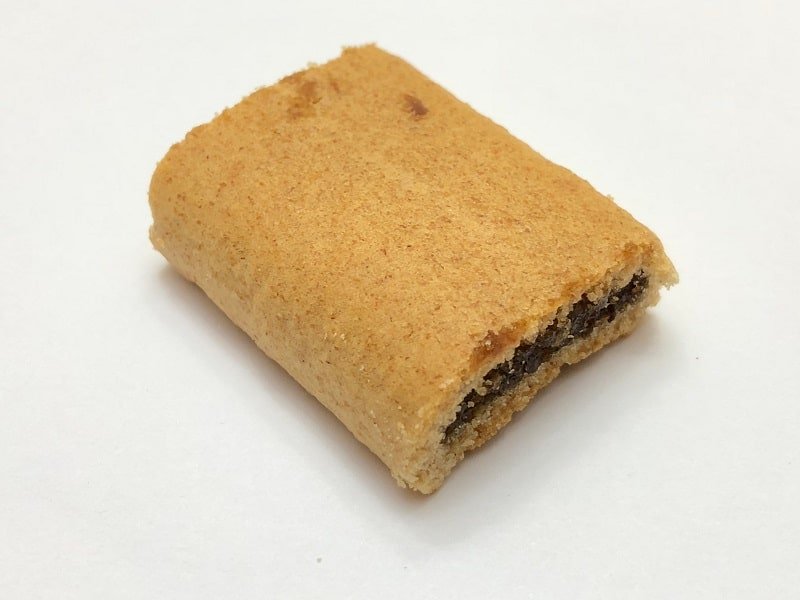Can Dogs Eat Fig Newtons? Pure Facts You Need To Know

If you own dogs and you love eating fig Newtons, then you may be tempted to give your dogs some to eat. But the question is “Can dogs eat fig Newtons?” Well, fig newtons are not toxic to dogs, so the answer is yes, dogs can eat fig newtons. But you need to also be aware of the risks of giving fig newtons to your pups.
Fig Newtons are soft and chewy cookies filled with delicious fig jam that may seem like an innocent snack to share with your pups. However, it’s important to consider the specific dietary needs and potential risks of fig Newtons for your four-legged pals.
Whether you’re a new or experienced dog owner, this blog post will provide you with the insights you need to make informed decisions about feeding your dog Fig Newtons. So, let’s dig in and discover the truth behind this popular treat and its suitability for our canine companions.
What are Fig Newtons?
Fig Newtons are a popular commercially produced snack that combines a soft, cake-like outer layer with a sweet fig filling. These treats have been enjoyed by humans for many years, but what about our furry companions? Before we delve into whether dogs can eat Fig Newtons, let’s take a closer look at what they are made of.

Ingredients commonly found in Fig Newtons
First, let’s examine the ingredients commonly found in Fig Newtons so that we can get the answer to our topic based on that.
So, Fig Newtons typically contain the following ingredients:
- Flour: The main component of the outer layer, usually made from wheat flour or a combination of wheat and other grains.
- Sugar: Added for sweetness, both in the outer layer and the fig filling.
- Figs: The star ingredient, providing the distinctive flavor and texture of Fig Newtons.
- Corn syrup: Used to enhance the sweetness and provide moisture.
- Vegetable oil: Often included to give the treats a soft and moist texture.
- Leavening agents: Baking soda and/or baking powder are used to help the outer layer rise and achieve a fluffy consistency.
- Natural and artificial flavorings: These are added to enhance the overall taste of the treats.
- Preservatives: To extend shelf life, Fig Newtons may contain preservatives such as calcium propionate.
It’s important to note that while Fig Newtons may seem like a harmless snack, not all ingredients in these treats are suitable for dogs. Before sharing any human food with your canine companion, it’s essential to consider their specific dietary needs and potential health risks.
Read also: Can Dogs Eat Blueberry Muffins? The Surprising Truth Revealed
Can Dogs Eat Fig Newtons?
Yes, dogs can technically eat Fig Newtons because they are not toxic for them, however, we don’t recommend it for dogs. You must only give Fig Newtons to your dogs occasionally and not as part of their diet. The reason is that while some components of Fig Newtons are safe for dogs to eat, others can pose potential risks and concerns. Hence, you must give Fig Newtons to dogs moderately or risk exposing them to health challenges.

Are Fig Newtons Bad For Dogs
Anytime a dog eats a large amount of something that they are not used to eating, it can cause some vomiting and diarrhea. This is not likely to become life-threatening but can be quite upsetting. Fig Newtons is one of the foods you must not give to your dogs in large amounts. These treats contain high levels of sugar, artificial ingredients, and preservatives, which can be harmful to dogs.
Excessive sugar consumption can lead to weight gain, dental issues, and potential complications like diabetes. Also, the artificial additives in Fig Newtons may cause digestive upset and allergic reactions in dogs.
It is best to avoid feeding Fig Newtons to your dog and opt for treats specifically formulated for their dietary needs.
Also, read this; Can Dogs Eat Banana Bread? Benefits and Potential Risks
Potential risks and concerns of feeding Fig Newtons to dogs
- High sugar content: Fig Newtons contain a significant amount of sugar, which can lead to weight gain, dental issues, and potential complications like diabetes in dogs. Excessive sugar consumption is not recommended for our furry friends.
- Artificial ingredients: Fig Newtons may contain artificial flavorings and preservatives, which can cause digestive upset or allergic reactions in dogs. These additives are not part of a natural and balanced canine diet.
- Fig filling: Figs themselves can be consumed by dogs in moderation (which we’ll discuss later), but the fig filling in Fig Newtons often contains added sugar and preservatives that may not be ideal for our canine companions.
- High in calories: While the exact calorie content may vary based on brand and serving size, Fig Newtons are generally calorie-dense treats. Feeding them regularly to your dog can contribute to weight gain and related health issues.
Considering these potential risks and concerns, it is advisable to exercise caution when offering Fig Newtons to your dog. While an occasional small piece may not cause harm, it’s best to explore safer alternatives that are specifically designed for dogs.

My Dog Ate a Fig Bar: What Should I Do?
Accidents happen, and it’s not uncommon for a curious dog to grab a Fig Newton or Fig Bar when we’re not looking. If your dog accidentally ingests a fig bar, here are some steps to consider:
- Assess the Situation: Determine the quantity of Fig Newton or Fig Bar consumed and whether it contained any additional ingredients that may be harmful to dogs, such as chocolate or raisins. The severity of the situation may depend on the size of your dog and the amount consumed.
- Monitor for Symptoms: Keep a close eye on your dog for any signs of gastrointestinal distress, such as vomiting, diarrhea, or a lack of appetite. Additionally, observe their behavior for any unusual symptoms or changes.
- Contact a Veterinarian: If you notice any concerning symptoms or are unsure about the potential risks, it’s always best to consult your veterinarian. They can provide professional advice based on your dog’s specific circumstances and guide you through any necessary steps.
Alternatives to Fig Newtons for Dogs
Although Fig Newtons may not be the best choice for our furry friends, there are plenty of alternative treats available that are safe and suitable for dogs. These options can provide a similar taste and texture without the potential risks associated with Fig Newtons. Here are some alternatives to consider:
- Homemade fig treats: If you want to give your dog a taste of figs, consider making your own dog-friendly fig treats at home. There are many simple and healthy recipes available that use fresh figs and other dog-friendly ingredients.
- Commercial dog treats: Look for dog treats specifically formulated with natural ingredients and flavors. Many reputable dogs treat brands offer fruit-flavored options that are safe for dogs, including fig-flavored treats.
- Fresh fruits: Instead of processed fig-based snacks, consider offering your dog fresh figs or other dog-safe fruits as an occasional treat. Fruits like apples, bananas, and berries can provide natural sweetness and beneficial nutrients for dogs.
- Vet-approved treats: Consult with your veterinarian to find commercially available treats that are safe and suitable for your dog’s specific dietary needs and preferences. Your vet can provide recommendations based on your dog’s age, breed, and any existing health conditions.
Can Dogs Eat Figs?
Yes, dogs can eat figs. Figs are safe for dogs to consume in moderation. They provide dietary fiber and essential nutrients such as potassium, calcium, magnesium, and vitamins A and K. Figs can aid in digestion and support overall health for dogs.
However, it’s important to remove the seeds before feeding figs to dogs, as they can pose a choking hazard. Introduce figs gradually into your dog’s diet and monitor their response for any signs of digestive upset. As always, consult with your veterinarian for personalized advice and recommendations regarding your dog’s diet and specific dietary restrictions.
Nutritional benefits of figs for dogs
Figs, when consumed in moderation, can offer some nutritional benefits to dogs. They are a good source of dietary fiber, which can aid in digestion and help regulate bowel movements. Figs also contain essential vitamins and minerals, including potassium, calcium, magnesium, and vitamins A and K. These nutrients can support your dog’s overall health and well-being.
How to introduce figs into a dog’s diet
If you’re considering adding figs to your dog’s diet, it’s important to do so gradually and in moderation. Here’s a step-by-step guide on introducing figs to your furry friend:
- Consult with your vet: Before adding any new food to your dog’s diet, consult with your veterinarian. They can provide specific guidance based on your dog’s individual needs and dietary restrictions.
- Choose ripe figs: Opt for ripe figs that are soft and free of any mold or signs of spoilage. Wash them thoroughly to remove any dirt or debris.
- Prepare the figs: Remove the stems and cut the figs into small, bite-sized pieces. It’s important to remove the seeds, as they can pose a choking hazard.
- Start with small portions: Begin by offering your dog a small piece of fig as a treat or mix it into their regular food. Monitor their reaction and observe for any signs of digestive upset or allergic reactions.
- Monitor your dog’s response: After introducing figs into your dog’s diet, observe how they respond. If they tolerate figs well and enjoy them, you can gradually increase the portion size. However, moderation is key, as excessive fig consumption can cause digestive issues.
Again, it’s worth noting that figs should never replace a balanced and complete diet formulated specifically for dogs. They should only be offered as occasional treats or additions to their regular meals.
Frequently Asked Questions Related To “Can Dogs Eat Fig Newtons?”
1. Can dogs eat fig Newton cookies?
Fig Newton cookies are not recommended for dogs. They contain ingredients such as added sugar and preservatives that can be harmful to dogs. It’s best to opt for dog-specific treats that are formulated to meet their nutritional needs.
2. Are there potential risks of feeding Fig Newtons to dogs?
Yes, there are potential risks associated with feeding Fig Newtons to dogs. These treats are high in sugar and may contain artificial ingredients that can cause digestive upset and other health issues. It’s advisable to explore safer alternatives specifically designed for dogs.
3. Can dogs eat figs, aside from Fig Newtons?
Yes, dogs can eat fresh figs in moderation. Figs can provide dietary fiber and essential nutrients for dogs. However, it’s important to remove the seeds and introduce figs gradually, monitoring your dog’s response.
4. Are there any health benefits of figs for dogs?
Figs can offer some health benefits to dogs when consumed in moderation. They are a good source of dietary fiber and contain essential vitamins and minerals that support overall health and well-being.
5. What are some alternatives to Fig Newtons for dogs?
There are many alternative treats available that are safe and suitable for dogs. Look for dog-specific treats made with natural ingredients and flavors. Additionally, fresh fruits and homemade treats can be a healthier alternative to Fig Newtons for dogs.
Conclusion – Can Dogs Eat Fig Newtons?
In conclusion, while Fig Newtons may be a tasty snack for humans, they are not the best choice for our canine companions. The high sugar content, artificial ingredients, and potential risks associated with Fig Newtons make them a less-than-ideal option for dogs.
However, if you’re interested in incorporating figs into your dog’s diet, fresh figs in moderation can offer some nutritional benefits. It’s crucial to consult with your veterinarian and introduce figs gradually, monitoring your dog’s response.
Remember, the key to providing a safe and healthy diet for your dog is to focus on specially formulated dog treats and balanced meals that meet their nutritional needs. By choosing the right treats and maintaining a well-rounded diet, you can ensure your furry friend’s health and happiness for years to come.
Read Other Food Resources
- Can Dogs Eat Salami? All You Need To Know
- Can Dogs Eat Quail Eggs?
- Can Dogs Eat Salt And Pepper?
- Can Dogs Eat Basil? All You Need To Know
- Can Dogs Eat Basil? All You Need To Know
References:
- Hepper – Can Dogs Eat Fig Newtons? What You Need To Know!
- Spoiled Hounds – Can Dogs Eat Fig Newtons? What to Know About Dogs and Fig Newtons





